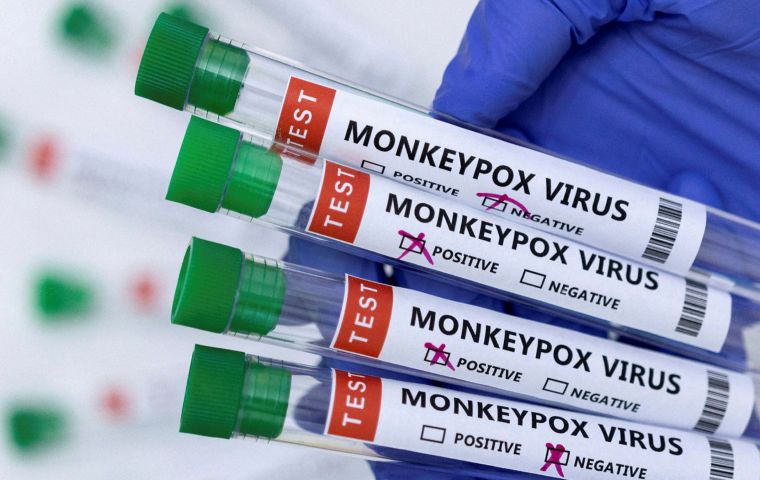MercoPress. South Atlantic News Agency
WHO insists vaccination against monkeypox not good for everyone
 First-generation vaccines held in national reserves “do not meet current safety and manufacturing standards,” a WHO report stated
First-generation vaccines held in national reserves “do not meet current safety and manufacturing standards,” a WHO report stated The World Health Organization (WHO) Tuesday insisted on its recommendation not to vaccinate people against monkeypox en masse, despite the recent increase in the number of cases.
“Mass vaccination is neither necessary nor recommended at this time,” said a WHO assessment report, which also stated that control of the outbreak relies mainly on surveillance, isolation of new cases, and contact tracing of those affected.
However, concern has grown in non-endemic countries. In this scenario, the European Union (EU) has decided to buy 110,000 doses of vaccine. Monkeypox causes flu-like symptoms and skin lesions, and spreads through close contact.
WHO stressed that vaccines against conventional smallpox (a disease eradicated worldwide in the late 1970s) could be effective in protecting against monkeypox, but some data was still missing and global supply is limited following the eradication of the malady some 40 years ago.
The global agency also announced it will convene an Emergency Committee June 23 to decide whether to declare an international emergency for the current monkeypox outbreak, with 1,600 confirmed cases and 1,500 others under study in both endemic (Africa) and non-endemic (Europe and the Americas) countries.
But the vaccines being recommended for use against monkeypox today are different from those used in the past. ”Some countries have maintained strategic supplies of older smallpox vaccines from the Smallpox Eradication Programme (SEP) which concluded in 1980,“ said the WHO's interim monkeypox vaccination guidance issued Tuesday.
”These first-generation vaccines held in national reserves are not recommended for monkeypox at this time, as they do not meet current safety and manufacturing standards,“ the document went on.
WHO has also said it was working with scientists to come up with a new name for the monkeypox virus that will not be “discriminatory and stigmatizing.” General Director Tedros Adhanom Ghebreyesus announced Tuesday that the organization was “working with partners and experts from around the world on changing the name of monkeypox virus, its clades and the disease it causes.” The agency is consulting experts in orthopoxviruses – the family to which monkeypox belongs – to come up with an appropriate name, it was reported. Tedros said the announcement about the new name will be made as soon as possible.
The initiative came after more than 30 scientists wrote last week that there was an “urgent need for a non-discriminatory and non-stigmatizing nomenclature for monkeypox virus” which is “aligned with best practices in the naming of infectious diseases in a way that minimizes unnecessary negative impacts on nations, geographic regions, economies and people and that considers the evolution and spread of the virus.”
A ”nomenclature of this virus being African is not only inaccurate but is also discriminatory and stigmatizing,” they said while encouraged authorities “to adopt a principled and neutral naming scheme.”
“We believe that this new classification will be easily adopted and is supported by the Africa Centre for Diseases Control and Prevention (Africa CDC) and we are in advanced discussion with the WHO,” they added.
The health agency is also holding an emergency meeting next week to determine whether to classify the outbreak as a public health emergency of international concern.




Top Comments
Disclaimer & comment rulesCommenting for this story is now closed.
If you have a Facebook account, become a fan and comment on our Facebook Page!